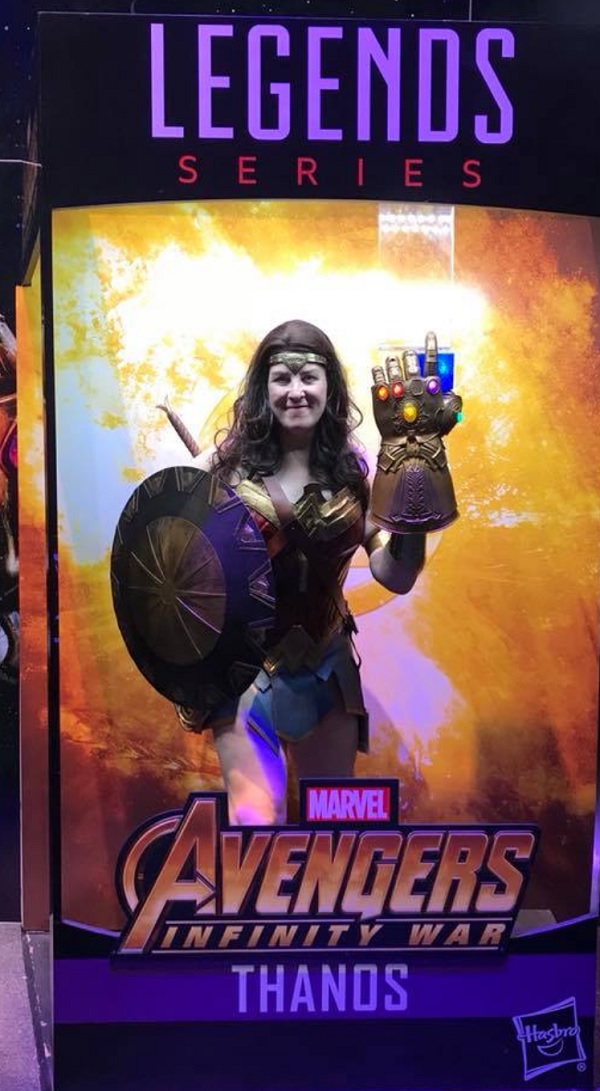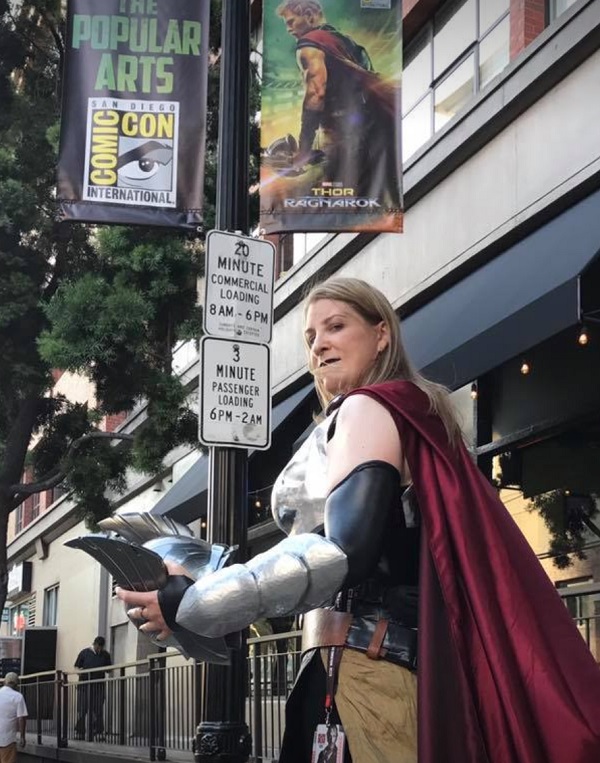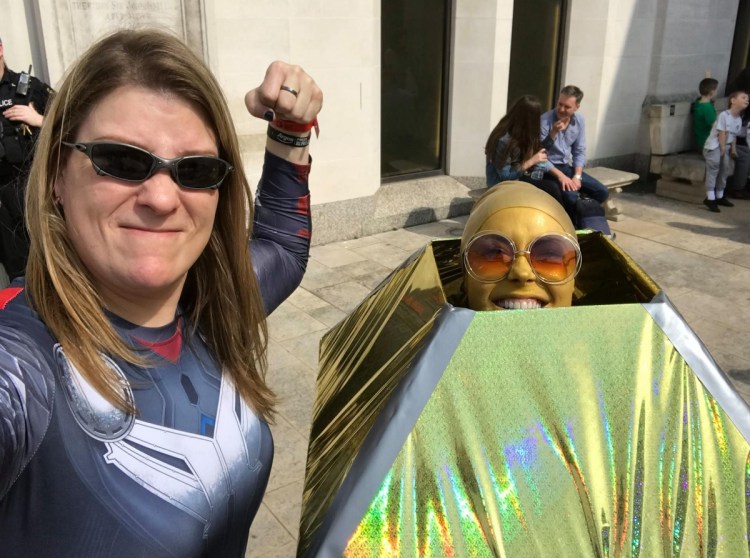GamesBeat: Did you get the usual mix of social media responses to all these things?
Edwards: Some people maybe felt we should have taken a stronger response. I think taking the honest response is the right way to go. The response is still counter to the WHO’s assertion. We just don’t have enough conclusive evidence to call it a disorder in the way they’re proclaiming. They should have opened it up to discussion and dialogue with the game industry. “From what we’re seeing at the WHO we think this could be a disorder. Let’s have a discussion with you about this.” That didn’t happen.

Above: Kate Edwards as Wonder Woman.
GamesBeat: The situation with ArenaNet seems to be a replay of a lot of things related to Gamergate.
Edwards: ArenaNet is an interesting case. Partially because, for a lot of us in the industry, at least from my perspective — maybe I have slight bias because I live in Seattle, so I’m more familiar with ArenaNet. But honestly, I’ve never heard people complain about the company as a workplace. I’ve always had the impression that it’s a very positive place to work, that their practices are on the up-and-up, that they carry themselves well as a company.
This was shocking, I think, to a lot of people. They never had the impression that ArenaNet was — part of how it’s being characterized now on various sides of the argument — it seems counter to what we know, or what we think we know.
GamesBeat: It’s interesting, because it’s an employee action. Usually firings happen very quietly. This one was very public. On top of that, the company is very publicly saying why they did it, and the employee is asking why they’re being so vocal about it.
Edwards: It’s not the usual case. I think frankly both sides could benefit from being quieter. I don’t mean they shouldn’t talk. I just mean that the level of noise that’s being generated right now is not healthy. From what I’ve seen it’s quickly devolved into a Gamergate-style online thing, which I don’t think any of us want to see. We don’t want to see that against ArenaNet or against the people who were fired. We don’t want to see it at all.
GamesBeat: Whoever selectively chooses which facts to emphasize in this case …
Edwards: Right. I’ve had discussions with people at ArenaNet who I know because I’m in the area. The facts versus the world that’s being built in the media — there’s some divergence, from my understanding. But of course, again, it can depend on who you’re talking to. My perspective, as always, is to gather the facts as best I can.
It’s the same issue with how I approach unionization and organized labor in the game industry. I have approached it for years with an open mind. Maybe we do need it. Let’s examine it carefully. Let’s look at what’s on the table, what’s happening in the industry. Maybe that’s a solution.
GamesBeat: Unionization, then, to you, is floating higher as an issue?
Edwards: I think so. That was basically my response to the issue when I was posting about it. To me it adds fuel to the argument. Now, what ArenaNet did behind the scenes exactly, none of us will never really know. But from what we can tell, from what happened, it does add to the fire — there’s an issue of relationships between companies, management of companies, and their employees, how they treat each other.
If it comes to the issue of, is there a social media policy at the company? If there is, great. Did the employee follow it? Yes or no? To what degree was that reinforced? Even if there is a policy, to what degree is the employee expected to be on as a representative of the company at all times? For some people, they just implicitly realize that when they’re working for some companies. For others, there’s a clear work-life balance separating that. I’m now speaking on Twitter on my behalf. But does that require the employee to then make a statement saying, “Attention, I am now speaking on my behalf, my comments do not reflect the opinions of my employer”?
GamesBeat: There’s this perfect behavior that can delineate what an issue is. But there’s no perfect behavior in this case. When is an employee on or off the clock? That’s an issue.
Edwards: Right. To me, that’s the core issue that’s come out of this. Does that relate to organized labor? I think it does. Again, that speaks to the interface between the employer and the employee, what the expectations are there. To loop that back to the broader issue of unionization, one of the key things I heard in all my years running the IGDA, listening to developers’ concerns around the world — the number one thing that was clear to me is that developers are desperate for leverage.
They want the ability to push back when they need to — not all the time, but when they need to, like on crunch. “We don’t want to work another 16-hour day.” Of course, typically, if they’re in that kind of situation, management will tell them, “That’s great. Go ahead and leave. I have 20 people who’ll take your job tomorrow.” They use that pressure to shut them up and keep them in their seat. That kind of thing frustrates developers.
One of the things that’s been contrasting is when you look across the aisle, so to speak, to other tech companies. Developers look at some of their friends who have left the industry to work at Google or Facebook or any number of companies. Those companies are also intense work environments, but they have a larger respect for their employee’s time. They have better policies around flex time. Of course they’re producing something entirely different. They’re not all working heads-down on a game, on a single creative vision. But they’re still working on some kind of product. I don’t see the divergence being that great.
Seeing that contrast, looking at friends in other companies, developers ask, “Wait, you’re not working this weekend? You get paid for this?” There’s a growing frustration about how we in the game industry are different, and not in a good way.

Above: Kate Edwards fits right in.
GamesBeat: Do you gauge whether — the ESA’s response was that unionization is a small concern for a small number of people.
Edwards: Yeah. [Laughs]
GamesBeat: Do you get the feeling that this is a bigger problem?
Edwards: Yes. It’s a significant issue, a very significant issue. Just going by the developer satisfaction survey results when I ran the IGDA — we created that survey, and in one of the surveys we had 56 percent of respondents saying they’d vote today for a union. In the survey about five years prior, it was only 33 percent. Going by the survey response, and just the anecdotal evidence from talking with so many people, my impression is that the desire for leverage is a lot greater now.
Part of that, too, is a generational factor. Part of it is being fed by — you have people who have different value sets. They have a greater desire to actually have a work-life balance. They have the same passion to make games that anyone else in the industry has had, but my sense is that they have a stronger sensibility around having a well-rounded lifestyle. Not just giving your life over to the game.
Just to footnote that, the ESA’s response is probably about as tone-deaf as I could have expected. I would expect them to be a little more up on the sense of things. But their constituents are companies. They’re not developers. It’s not shocking. But I can say with complete confidence that the sentiment right now is much stronger than they think it is.
GamesBeat: The ArenaNet thing has probably affected that.
Edwards: I think it has. Any issue we see pop up, any issue that emphasizes that there is a disconnect between the expectations from employer to employee in this industry — we’ve seen that time and again in the work-life arena with crunch. We’ve seen it with other issues like lack of diversity and inclusion, the lack of will from companies to change that. Not universally. Some companies are doing better, are doing very well. But there are lots of issues like that. Any time something like this happens, it revives that concern. It’s fueling a greater sentiment, in my view.
GamesBeat: Are there any other big things on your mind lately?
Edwards: Stuff like indies being screwed over by publisher contracts — can a union stop that? Not in my view. They’re not going to be able to deal with that. That’s why my approach to providing leverage is to explore the unionization angle, because I think that’s going to help a lot of people in the industry, but it’s not going to help everybody. I can’t see a three- or five-person indie studio unionizing. They’re basically all management and employees at the same time. For larger companies, yes, but for small companies and other cases, I think our industry could use a legal defense fund.
That’s one thing I’m working on more fervently at the moment. That would have more universal applicability. If you’re being harassed at a triple-A company and your managers aren’t listening to you, you would have a resource. If you’re an indie who needs help with a contract, you’d have a resource.

